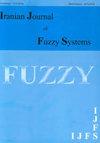A fuzzy generalized predictive controller to optimal drug dosage therapy of mathematical modeling of HIV
IF 1.2
4区 数学
Q1 MATHEMATICS
引用次数: 0
Abstract
This paper proposes a fuzzy-GPC based on a mathematical model of human immunodeficiency virus (HIV) to determine the drug dosage and control the progression of the illness. For this purpose, a Takagi-Sugeno (TS) fuzzy model is generated to identify the nonlinear behavior of HIV. The parameters of HIV are estimated by the least square error (LSE) estimation method. Moreover, three scenarios are proposed to control HIV. In scenario 1, according to TS fuzzy model, generalized Predictive Control (GPC) is designed for a daily base drug therapy. Scenario 2 and 3 are more practical. In scenario 2, since the biological behavior of patients are different, the variation in the patients biology is taken into account by generating data according to a group of patients with varying parameters in their mathematical model. In senario3, since daily diagnosis of patient’s health is costly, it is assumed that a patient information is available every month, and drug dosage is determined each month. As a result of which, the sample time of the measurement increases to 30 make it a multi-rate system. The result shows that the TS fuzzy models the mathematical model of HIV very well, and in all scenarios, the proposed controller has a good performance and the number of healthy cells are controlled in acceptable amount.HIV最优药物剂量治疗数学模型的模糊广义预测控制器
本文提出了一种基于人类免疫缺陷病毒(HIV)数学模型的模糊gpc方法,用于确定药物剂量和控制疾病的进展。为此,建立了一个Takagi-Sugeno (TS)模糊模型来识别HIV的非线性行为。采用最小二乘误差(LSE)估计方法对HIV参数进行估计。此外,还提出了三种控制HIV的方案。在场景1中,根据TS模糊模型,对每日基础药物治疗设计广义预测控制(GPC)。场景2和场景3更实际。在场景2中,由于患者的生物学行为不同,因此根据数学模型中具有不同参数的一组患者生成数据,从而考虑到患者生物学的变化。在情景3中,由于每天诊断病人的健康状况是昂贵的,因此假定每个月都有病人的信息,并且每个月确定药物剂量。因此,测量的采样时间增加到30,使其成为一个多速率系统。结果表明,TS模糊模型能很好地模拟HIV的数学模型,在所有情况下,所提出的控制器都具有良好的性能,健康细胞的数量被控制在可接受的范围内。
本文章由计算机程序翻译,如有差异,请以英文原文为准。
求助全文
约1分钟内获得全文
求助全文
来源期刊
CiteScore
3.50
自引率
16.70%
发文量
0
期刊介绍:
The two-monthly Iranian Journal of Fuzzy Systems (IJFS) aims to provide an international forum for refereed original research works in the theory and applications of fuzzy sets and systems in the areas of foundations, pure mathematics, artificial intelligence, control, robotics, data analysis, data mining, decision making, finance and management, information systems, operations research, pattern recognition and image processing, soft computing and uncertainty modeling.
Manuscripts submitted to the IJFS must be original unpublished work and should not be in consideration for publication elsewhere.

 求助内容:
求助内容: 应助结果提醒方式:
应助结果提醒方式:


